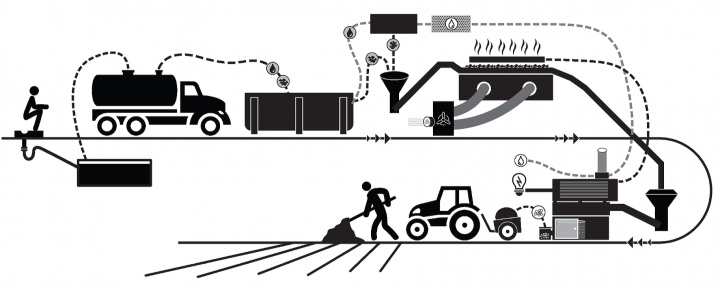Purpose
To develop a system that can power an appliance for sanitation in areas where electricity is not available or economically feasible
Activities
Under this project, Biomass Controls PBC (Biomass Controls) of Woodstock, Connecticut will explore and develop micro-combined heat and power (mCHP) technology for off-grid resource recovery of human feces and/or other biogenic materials. This work shall be, initially, in conjunction with the Biomass Controls Biogenic Refinery being presently operated in India and the United States.
Biomass Controls shall investigate available thermal power generator technologies, develop metrics for determining compatibility to the energy balance, and finally work to integrate selected technologies into the Biogenic Refinery. Being a condition of the sustainable sanitation solution that it operates off-grid, Biomass Controls has already explored several options for power generation with biogenic fuels.
In 2013, under the Bill and Melinda Gates Foundation Reinvent the Toilet (RTT) Challenge a transportable system for the drying and refining of human solid feces to thermal energy and granulated carbon (biochar) was developed using control technology from Biomass Control’s and components from AgFuel Energy Systems.
This first prototype did not include a self-sustaining power solution that will be required for installation in locations such as Africa. The Biogenic Refinery project would be more widely adaptable if it contained a power solution to operate in rural areas where energy from fossil fuels is not financially feasible.
Update in Feb. 2017:
Thermal Power Generation Summary:
- Thermoacoustic: Not commercially available
- Thermoelectric: Limited generation potential
- Stirling: Not commercially available
- Steam: Viable option
- Organic Rankine Cycle: Viable option
Thermal Power Generation Conclusion:
- Eliminate Dryer
- Grinder for pre-processing supplemental fuel
- Smaller Footprint
Images

Image: Schematic of the process
Countries of activity
Location of main activity
Objectives
Goal: Identify technologies that can use thermal energy from fecal sludge to generate electrical power under 1 MW.
THE GOAL:
- Off-grid pyrolysis unit
- Economically viable
- Treat faecal sludge from 500-10,000 individuals
- No harmful pollutants, no safety hazards
- Carbon neutral or negative
Objectives:
To develop a system that can power an appliance for sanitation in areas where electricity is not available or economically feasible, such as Africa or India, thus enabling self-sustaining technologies for use by the poor in the developing world. The power system will be fed either directly from fecal waste or the product of a fecal waste processing system.
Further information
Developing country where the research is being or will be tested: India (India initially, with various Africa countries later)
Research or implementation partners: Tide Technocrats, Bengaluru, India
Current state of affairs (Aug. 2017): Demonstrations are underway, with further iterative development ongoing. Framework for management of faecal sludges is in development with several partners in different areas of the sanitation service delivery chain.
Next steps:
- Energy, enthalpy, mass, and mass carbon balance
- Product Integration
- Exploring hybrid power options
Contact information
Jeffrey Hallowell
Login to see the e-mail-adress of the contact person.
Derek DeSouza
Login to see the e-mail-adress of the contact person.
Filter tags
Bill & Melinda Gates Foundation East Asia & Pacific Energy: electricity, hydrogen, fuel cells Faecal sludge treatment processes Faeces or faecal sludge Fundamental research and engineering North America Private sector, including social enterprises Product design and engineering Specific to one or several countries Treatment of faecal sludge
















